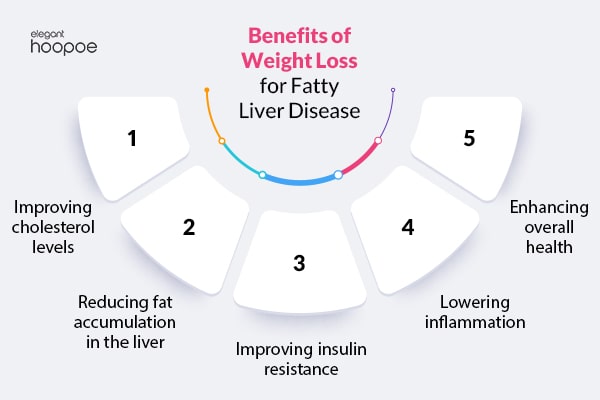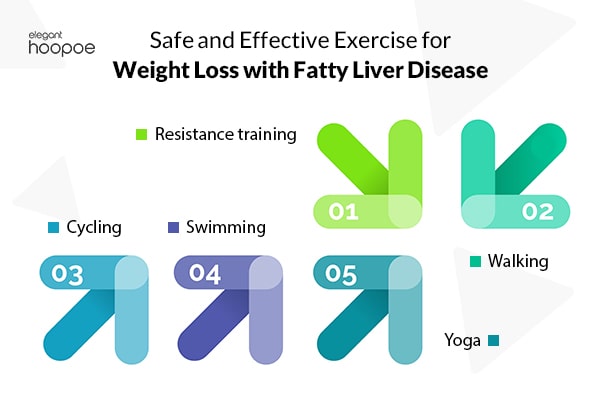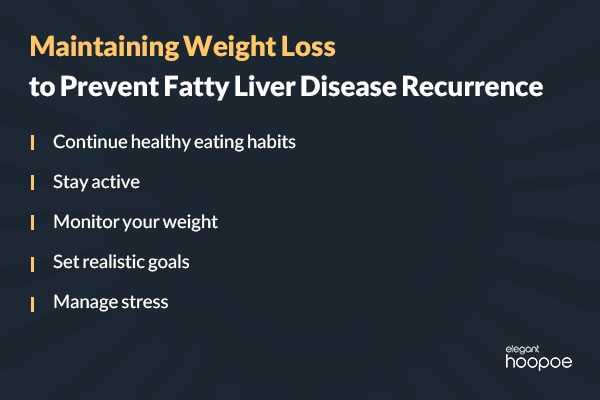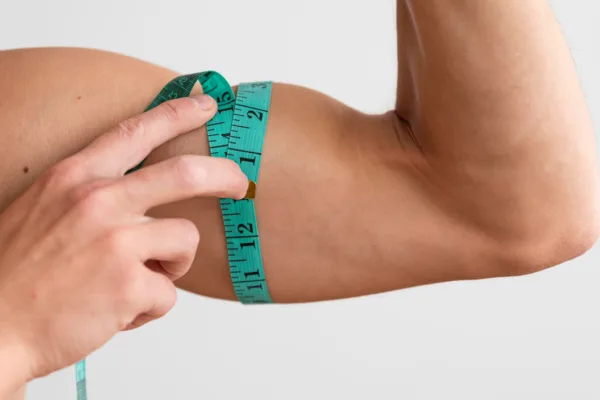Can Losing Weight Reverse Fatty Liver Disease? The Link Between Liver and Weight Loss
Losing weight can significantly improve liver health, particularly for those with non-alcoholic fatty liver disease (NAFLD). Key benefits include:
- Reducing liver fat to prevent further damage.
- Improving insulin resistance, lowering diabetes risk.
- Lowering inflammation to prevent progression to serious conditions like cirrhosis.
- Enhancing cholesterol levels for better overall health.
Safe weight loss strategies include gradual weight loss, a balanced diet, regular exercise, and professional guidance. Rapid weight loss may worsen liver health, so a sustainable approach is key.
Losing weight with fatty liver, is it possible? Maintaining a healthy weight is important for overall health, and it is particularly important for liver health. The liver is a vital organ responsible for detoxifying the body, processing nutrients, and producing bile to aid in digestion. However, when excess fat accumulates in the liver, it can lead to a condition called non-alcoholic fatty liver disease (NAFLD). NAFLD can progress to more serious conditions such as non-alcoholic steatohepatitis (NASH) and cirrhosis, which can be life-threatening.
Weight loss has been shown to have significant benefits for liver health. It can be beneficial for liver health and is an important component of managing and preventing liver diseases such as NAFLD.
However, losing weight with fatty liver disease can be challenging, It is important to approach weight loss healthily and sustainably, This may involve a combination of dietary changes, regular exercise, and lifestyle modifications, under the guidance of a healthcare professional.
In this article on Elegant Hoopoe, we will explore the link between fatty liver disease and weight loss, and guide safe and effective strategies for losing weight with this condition.
The Link Between liver and Weight loss

Fatty liver disease is closely linked to excess weight and obesity. When we consume more calories than we burn, the body stores the excess calories as fat. Over time, this can lead to an accumulation of fat in the liver, which can cause inflammation and damage to liver cells.
The accumulation of fat in the liver can lead to a condition called non-alcoholic fatty liver disease (NAFLD). NAFLD is becoming increasingly common and affects up to 25% of the global population. People who are overweight or obese are at a higher risk of developing NAFLD, and the condition is also associated with insulin resistance, type 2 diabetes, and high cholesterol.
Related article: Is losing weight good for blood pressure? What does the research says?
When fat accumulates in the liver, it can cause inflammation, oxidative stress, and damage to liver cells. Over time, this can lead to the development of more serious liver conditions, such as non-alcoholic steatohepatitis (NASH) and cirrhosis, which can be life-threatening.
The good news is that losing weight can help reverse fatty liver disease and improve liver function. Shedding excess weight can reduce fat accumulation in the liver, improve insulin resistance, and reduce inflammation. This can lead to an improvement in liver function and a decreased risk of developing more serious liver conditions.

Benefits of Weight Loss for Fatty Liver Disease
Weight loss can provide numerous benefits for people with fatty liver disease. Here are some of the key weight loss benefits for fatty liver disease:
- Reducing fat accumulation in the liver: Losing weight can help reduce the amount of fat that accumulates in the liver, which can help improve liver function and reduce inflammation.
- Improving insulin resistance: People with fatty liver disease often have insulin resistance, which can lead to high blood sugar levels and an increased risk of type 2 diabetes. Losing weight can improve insulin resistance and reduce the risk of developing diabetes.
- Lowering inflammation: Fatty liver disease can cause inflammation in the liver, which can lead to scarring and more serious liver conditions. Losing weight can reduce inflammation and improve liver health.
- Improving cholesterol levels: People with fatty liver disease often have high levels of cholesterol and triglycerides, which can contribute to liver damage. Losing weight can help improve cholesterol levels and reduce the risk of developing heart disease.
- Enhancing overall health: Losing weight can have numerous health benefits, including reducing the risk of developing other chronic conditions such as heart disease, stroke, and certain types of cancer.
related article: lower belly fat
It is important to note that weight loss should be approached healthily and sustainably, and under the guidance of a healthcare professional. Rapid weight loss can be harmful to people with fatty liver disease, as it can worsen liver function and increase inflammation. A balanced diet and regular exercise are the keys to achieving long-term weight loss and improving liver health.
How To Lose Weight With Fatty Liver?

Losing weight with fatty liver disease can be challenging, but several approaches can be effective. Here are some of the best strategies:
- Gradual weight loss: Rapid weight loss can be harmful to people with fatty liver disease, as it can worsen liver function and increase inflammation. A safe and effective approach is to aim for a weight loss of 1-2 pounds per week.
- Balanced diet: A balanced diet that is low in calories, high in fiber, and rich in fruits, vegetables, whole grains, and lean protein can help promote weight loss and improve liver function. Avoiding processed foods, sugary drinks, and saturated and trans fats is also recommended.
- Regular exercise: Regular exercise can help promote weight loss and improve liver health. Aim for at least 30 minutes of moderate-intensity exercise, such as brisk walking or cycling, on most days of the week.
- Behavioral changes: Changing habits and behaviors can help support long-term weight loss. This may involve setting realistic goals, tracking food intake and physical activity, and finding support from friends, family, or a healthcare professional.
- Medications and supplements: Medications and supplements may be recommended in some cases to aid weight loss, but these should only be taken under the guidance of a healthcare professional.
It is important to note that there is no one-size-fits-all approach to weight loss with fatty liver disease. Working with a healthcare professional or a registered dietitian can help develop an individualized weight loss plan that is safe and effective.
Diet For Fatty Liver
Diet plays a critical role in weight loss for fatty liver disease. A balanced and varied diet, rich in whole foods and low in processed foods, is key to promoting weight loss and improving liver health. Here are some key dietary changes that can support weight loss and improve liver function:
- Reduce calorie intake: To lose weight, it is important to consume fewer calories than you burn. Reducing portion sizes, choosing low-calorie foods, and avoiding sugary drinks can all help reduce calorie intake. If you are planning to follow a low calorie diet then you might find this diet program useful.
- Choose healthy fats: Healthy fats, such as those found in nuts, seeds, avocados, and fatty fish, can help promote weight loss and improve liver health. Saturated and trans fats, found in processed foods, should be avoided.
- Increase fiber intake: Fiber-rich foods, such as fruits, vegetables, whole grains, and legumes, can help promote weight loss and improve liver function. Fiber also helps to promote feelings of fullness and reduce overall calorie intake.
- Avoid added sugars: Sugary drinks and foods can contribute to weight gain and liver damage. It is important to read food labels and avoid products that contain added sugars.
- Limit alcohol intake: Alcohol can cause liver damage and contribute to weight gain. People with fatty liver disease should limit their alcohol intake or avoid alcohol altogether.

Exercises To Lose Weight with Fatty Liver
Exercise is an important part of weight loss for people with fatty liver disease, but it is better to choose safe and effective exercises that won’t put undue stress on the liver. It is important to start slowly and gradually increase the intensity and duration of exercise. Here are some exercises that are safe and effective for weight loss with fatty liver disease:
- Walking: Walking is a low-impact exercise that is safe for most people with fatty liver disease. Aim for at least 30 minutes of brisk walking most days of the week.
- Cycling: Cycling is another low-impact exercise that can help promote weight loss and improve liver function. It is also a good option for people who may have joint problems or find walking uncomfortable.
- Swimming: Swimming is a full-body workout that is easy on the joints and can help promote weight loss. It is also a good option for people who may have mobility issues or find other forms of exercise uncomfortable.
- Resistance training: Resistance training, such as lifting weights or using resistance bands, can help build muscle and boost metabolism, which can aid in weight loss. It is important to start with light weights and gradually increase the intensity to avoid injury.
- Yoga: Yoga is a low-impact exercise that can help reduce stress, improve flexibility and balance, and promote weight loss. There are many different types of yoga, so it is important to find a class that is appropriate for your fitness level
More advanced workouts to lose weight with a fatty liver
If you already have done a moderate and beginner-friendly workout plan and you are ready to move up to a higher level type of exercise then you should consider High intensity interval trainings as well. This type of working out will make your metabolism much faster and you can burn much more calorie doing them.
Weight lifting is also another recommended type of workout you can try. With weight lifting you will not only create a good calorie deficit but also will shape different muscles groups in your body which ultimately result in a much more better body composition.
It is important to note that you should only get your exercise plan from an experts that knows your condition.
Medications and Supplements
While lifestyle changes, such as diet and exercise, are the first line of treatment for weight loss and fatty liver disease, some medications and supplements may also be helpful. Here are some options:
- Orlistat: Orlistat is a prescription medication that blocks the absorption of some of the fat you eat. It is approved for long-term use and can help with weight loss and improve liver function.
- Metformin: Metformin is a medication commonly used to treat type 2 diabetes, but it may also be helpful for weight loss and improving liver function in people with fatty liver disease. It works by reducing insulin resistance and lowering blood sugar levels.
- Vitamin E: Vitamin E is a powerful antioxidant that may help reduce liver inflammation and damage. Some studies have shown that it may also be helpful for weight loss in people with fatty liver disease.
- Omega-3 fatty acids: Omega-3 fatty acids, found in fatty fish, nuts, and seeds, may help reduce liver inflammation and improve liver function. Some studies have also shown that omega-3s may be helpful for weight loss.
- Green tea extract: Green tea extract is a supplement that may help promote weight loss and improve liver function. It contains compounds called catechins, which have been shown to reduce liver fat.
It is important to talk to a healthcare professional before starting any new medication or supplement, as some may interact with other medications or have side effects. In addition, supplements are not regulated by the FDA, so it is important to choose a reputable brand and follow dosage instructions carefully.
Rapid Weight Loss and Its Risks for Fatty Liver Disease
While weight loss is important for managing fatty liver disease, it is important to lose weight at a moderate pace to avoid potential risks and complications. Rapid weight loss can increase the risk of liver inflammation and damage, as well as gallstones. Here are some tips for managing rapid weight loss and its risks for fatty liver disease:
- Aim for gradual weight loss: It is recommended to aim for a weight loss of 1-2 pounds per week. This can be achieved through a combination of diet and exercise.
- Monitor your symptoms: It is important to monitor your symptoms closely while losing weight, as rapid weight loss can cause fatigue, weakness, and other symptoms. If you experience any new symptoms, it is important to talk to your healthcare professional.
- Stay hydrated: Rapid weight loss can increase the risk of dehydration, so it is important to drink plenty of water and other fluids to stay hydrated.
- Incorporate resistance training: Resistance training, such as lifting weights, can help build muscle and prevent muscle loss during weight loss.
- Avoid crash diets: Crash diets, which involve severely restricting calories or food groups, can be dangerous and increase the risk of liver damage. It is important to follow a balanced and nutritious diet for weight loss.
- Talk to your healthcare professional: If you have fatty liver disease, it is important to work with a healthcare professional to develop a safe and effective weight loss plan. They can monitor your progress and adjust your plan as needed to manage any potential risks.
Although lose weight fast is not recommended for those facing liver disease some new studies suggests that it might have some benefits on contrast to what most people believe. For instance a research done by NDPCHS showed that a three months rapid weight loss plan was safe and effective and decreasing the severity of non-alcoholic steatohepatitis with liver fibrosis.
NASH with liver fibrosis is affecting nearly two percent of the world adult population can lead to liver cirrhosis and liver cancer. It is important to note that you should only get your weight loss program from a certified doctor or dietitian that knows your health condition.

Maintaining Weight Loss to Prevent Fatty Liver Disease Recurrence
Maintaining weight loss is essential for preventing the recurrence of fatty liver disease. Here are some tips for maintaining weight loss:
- Continue healthy eating habits: It is important to continue following a balanced and nutritious diet even after reaching your weight loss goals. This can help prevent weight regain and reduce the risk of fatty liver disease recurrence.
- Stay active: Regular physical activity is important for maintaining weight loss and improving overall health. Aim for at least 150 minutes of moderate-intensity activity per week, such as brisk walking or cycling.
- Monitor your weight: Monitoring your weight regularly can help you catch any weight gain early and make adjustments to your diet and exercise routine as needed.
- Set realistic goals: Setting realistic goals for weight maintenance can help you stay motivated and avoid the frustration of unrealistic expectations.
- Manage stress: Stress can trigger emotional eating and make it harder to maintain weight loss. Find healthy ways to manage stress, such as meditation, yoga, or talking to a therapist.
Monitoring Liver Function While Losing Weight
Monitoring liver function is crucial when losing weight with fatty liver disease. Here are some ways to monitor your liver function during weight loss:
- Regular check-ups: It is important to schedule regular check-ups with your healthcare professional to monitor your liver function and overall health.
- Blood tests: Blood tests, such as liver function tests and tests for markers of liver inflammation, can help monitor the health of your liver during weight loss.
- Imaging tests: Imaging tests, such as ultrasound or MRI, can help monitor the amount of fat in your liver and any changes in liver size or shape.
- Watch for symptoms: If you experience any new symptoms, such as fatigue, abdominal pain, or jaundice, it is important to talk to your healthcare professional immediately.
- Adjust your weight loss plan: If you experience any liver-related complications or worsening of liver function, it may be necessary to adjust your weight loss plan or work with your healthcare professional to manage any potential risks.
Can weight loss procedures cure fatty liver?
Other than working out and following a diet there are other weight loss methods such as liposuction but you should know that just because these treatment can help you lose some extra fat pockets in your belly that does not mean that they can clear out your liver from fat cells. According to NIH: liposuction will not lead to improvement in insulin sensitivity not it will enhance the metabolic profile therefor it is not suitable for people with non-alcoholic fatty liver disease.
A patient might be eligible to undergo non-invasive methods but without proper diet and regular workout session it is not possible to get rid of fatty liver or to get back in a better shape.
conclusion
Losing weight is an important part of managing and even reversing fatty liver disease. It can reduce liver fat, inflammation, and the risk of complications such as liver cirrhosis and liver cancer. However, it is important to approach weight loss with caution and work closely with a healthcare professional to develop a safe and effective plan.
A combination of healthy eating, regular physical activity, and, in some cases, medications and supplements can help achieve weight loss goals. Monitoring liver function during weight loss is also crucial to managing any potential risks or complications. Finally, maintaining a weight loss is important for preventing the recurrence of fatty liver disease.
By adopting healthy lifestyle habits and working with healthcare professionals, individuals with fatty liver disease can successfully achieve and maintain weight loss and improve their liver health.








